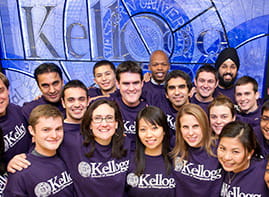Experts consider how to navigate uncharted territory at daylong Kellogg leadership summit
10/31/2008 - She graduated college during the recessionary period of the 1970s, but Nancy Cooper, executive vice president and chief financial officer of CA Inc., said that she and her peers have never seen economic times like today’s challenging markets.
“This is new territory for all of us,” she said Oct. 15 at the James L. Allen Center, where she delivered a keynote address at the Kellogg Leadership Conference. “The only certain element in every downturn is that it will end. The only lesson I can impart is, ‘Don’t panic.’ Well-run companies will emerge from this economic crisis better positioned.”
This year’s conference theme was “Leading in a Changing World.” Cooper was one of three keynotes at the daylong event.
Cooper expressed confidence about the prospects of CA, which has enjoyed seven consecutive quarters of growth after she joined two years ago and implemented cost controls. “A year ago, analysts were critical of us for having too much cash,” she said. “Our management team resisted the pressure, and boy, are we glad we did.”
Successful companies must maintain strong investor relations by continuously communicating, simultaneously considering the current quarter and the longer term, building a diverse workforce, and keeping focused on the big picture, Cooper said.
“There are always tradeoffs. You can’t give everyone everything they want,” she told conference attendees. “If you don’t have headlights to know where you’re going, you can’t make the right business decisions or advise Wall Street.”
Business leaders must resist temptations that would compromise their ethics, but they must embrace uncertainty, Cooper said. “Be alert to opportunities. Given how much the business world is changing, any career path you may have set out for yourself a year ago, or even a month ago, may have to be altered.”
A panel discussion, one of four at the event, focused on leadership challenges in the financial services industry. Panelists examined the fallout from the recent banking and mortgage meltdown in the U.S. With all five of the largest investment banks either out of business, merged or shifting focus, “You’ve seen a remarkable change that’s tested the leadership in the financial services industry,” said David Stowell, a Kellogg professor who moderated.
Steve Braverman, president of Harris myCFO Investment Advisory Services LLC, joked that he used to watch football on the weekends. Now, his time is spent wondering which firm will make it until Monday. “Financial services leaders need to communicate to their people during these tough times,” he said.
Many in the industry saw difficult times ahead two or three years ago, said Jim Sohigian, principal at Deloitte Consulting LLP. “Could all of this been avoided? No,” he said. “Could the damage have been minimized? Yes. Once the dust clears, we’ll be able to analyze it.”
James Reddinger ’98, managing director with UBS, believes banks expanded their roles too much. “When you get outside your scope of capabilities, it’s going to cause a problem,” he said. But in the near term, people in the industry need to find solutions rather than placing blame, Reddinger said.
“It’s a mess. It stinks,” he said. “Some people mismanaged their banks. Some people mismanaged their households. Some people mismanaged their companies. Let’s not point fingers. Fifty years from now, it would be helpful to have a case study.”
With a stock price that has stayed steady while the market dropped 4,000 points, Alberto-Culver Company might make a case study right now. Carol Lavin Bernick, executive chairman of the board, said the company, founded by her parents in 1955, is the fourth largest in an industry that has undergone rapid consolidation in recent years. “We’re a tiny company that picked a niche and worked hard to win,” Bernick said during her keynote address.
Alberto-Culver has recovered nicely from a downturn of its own in the 1990s that saw profits slide from 13.8 percent in 1988 to 3.4 percent in 1994. A Hewitt survey taken at the time showed a culture of silos, low morale and high turnover.
Those insights led to leadership changes and a restructuring to create Group Development Leaders who communicate important messages back to employees and solicit feedback. Employees are helped to understand what Alberto-Culver calls their Individual Economic Value to the company, Bernick said.
“You need to crystallize for people how they help to drive sales and profit,” she said. “Everybody will tell you what to do. Everybody will tell you how to do it. But not a lot of companies will tell you why. It’s not what you tell people, it’s how they hear it.”
John Alexander, vice president, new business and innovation, Whirlpool Corp., also delivered a keynote address, at the conference. The event concluded with a networking reception.






